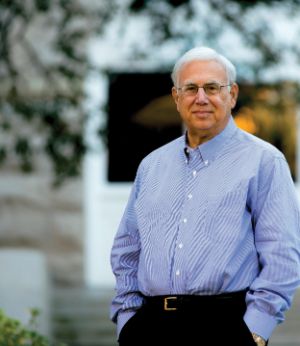features
A 'Call to Duty'
Interim President Scott Cowen is a veteran of crises and teacher of leadership who likes to get things done
 PHOTO: Paula Burch-Celentano
PHOTO: Paula Burch-CelentanoScott Cowen
After Scott Cowen, DBA, led Tulane University through the devastation and aftermath of Hurricane Katrina in 2005, TIME magazine named him one of the nation's 10 Best College Presidents. Now Cowen, (HON '11), is back at Case Western Reserve University as interim president, leading a university he said "made a bet on me" by naming him dean of the Weatherhead School of Management when he was just 37. He spent 23 years at the school, with 14 at the helm. In 2015, he joined the university's Board of Trustees after retiring from Tulane. Having spent more than 30 years in leadership—and written and taught extensively on the subject—Cowen has clear ideas about vision, execution, tone and culture. So, no need to call him President Cowen. "I'd much prefer people just call me 'Scott,'" he said. "And the reason is, I'm one [member of the team I'm leading]. I may have a different title and set of responsibilities, but I'm no better, no worse."
How do you see your interim role?I see myself with three major goals: First and foremost is making sure that as we go through COVID-19, we have made the kinds of decisions that really protect our human capital—our faculty, staff and students. No. 2 is to pave the way for the new, permanent president. And third is to continue to advance the institution—that if there are initiatives where I can add some unique value because of my history in Cleveland and my history at Case Western Reserve University, I will use that time to see if I can advance the university. By nature, I'm not a caretaker; I tend to want to get things done.
You called the nine-month commitment "a call to duty." Why?I've said many times that whatever successes I've had in my life, I owe in great part to Case Western Reserve University. I became dean of the Weatherhead School when I was 37 years old, at a time that if you really looked at my vita, I'm not sure I deserved to be dean. But the university made a bet on me. I like to believe it worked out for them; it certainly worked out for me. At Case Western Reserve University, I also had an opportunity to meet my wife [Marjorie Cowen (MGT '82), who died in 2019]. And then I had the pleasure of working with her for 16 years at the Weatherhead School. So, a lot of what I took to my presidency at Tulane University, the foundation was really built in Cleveland and at Case Western Reserve University. And, quite honestly, the lessons I learned here were very helpful there, and especially during Hurricane Katrina.
You've written about how the pandemic has the potential to transform higher education.The pandemic mobilized virtually every college and university, every faculty member, every student and every staff member to go from being on campus to doing their work remotely. There's a lot to be learned from that experience—positives and negatives. How students learn, where they learn, what is the best technology we could use that could enhance learning, how do we enhance the collegiate experience if students are not on campus? And the list goes on.
So shame on us in higher ed and at Case Western Reserve University if we don't take some time when things stabilize to reflect on what has occurred and how we might permanently change the university and take advantage of some of the silver linings that may have come out of this tragedy.





